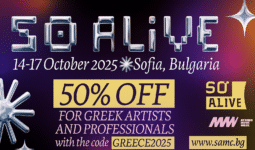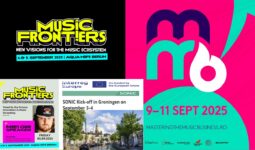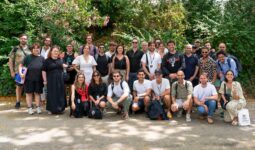HEMI: Six Years of Building Bridges for Music, Innovation, and Exchange

After six years of collaboration, the Hub for the Exchange of Music Innovation (HEMI) has officially completed its journey, concluding with excellent feedback and recognition from the European Commission. This milestone marks more than the end of a programme. It celebrates a shared achievement. What began as an ambitious idea between a handful of committed partners has grown into a recognised reference for regional cooperation and innovation in the European music sector. As we close this chapter, it feels like the right moment to reflect on what we built together, what we learned, and how this collective experience now shapes the path ahead. The idea for HEMI did not appear overnight. It grew from years of groundwork, collaboration, and a shared belief that regional cooperation in music and culture could become a driver for growth, visibility, and sustainability. It was during a meeting at PIN Conference in Skopje in 2017 (we applied in Dec. 2018) that the first seeds of HEMI were planted. In dialogue with several partner organizations we were already collaborating with, our team recognized the need to create a structured platform that could link music professionals and emerging markets across Central and Southeastern Europe. From that point forward, we took on the challenge of shaping the concept, identifying partners, and building a framework that could turn this shared vision into a coordinated European initiative. This momentum was not created in isolation. We had already gained experience through mid- and large-scale European projects such as JUMP – European Music Market Accelerator, NIMPE – Network for the Internationalisation of Music Producers in Europe, and through our long-standing coordination of the Fête Européenne de la Musique network and the European Live Music Association (ELMA). These collaborations revealed both the strengths and the structural gaps of the European music sector and helped us understand how regional mobility, skills, and cooperation could be developed over time. At that time, most of the countries in this region were still on the periphery of Europe’s music map. Travel barriers, fragmented markets, multiple currencies, and the small scale of many domestic industries made it difficult for artists and professionals to reach international stages or sustain careers beyond their borders. Many projects relied on personal dedication rather than institutional support or structured transnational frameworks. HEMI was created to change this. Thanks to the co-funding scheme of the Creative Europe Programme of the European Commission, and together with Technopolis City of Athens, which believed in the vision and took the lead of the consortium, we helped structure a partnership of nine organizations from the Balkans and the Baltics. The project followed a cluster-based cooperation model, bringing together festivals, export offices, incubators, and creative enterprises. It was not an easy structure to coordinate, but it reflected the true complexity and potential of our region. Two years later, the pandemic disrupted everything. Despite the challenges, HEMI adapted, introducing hybrid formats, remote mentoring, and digital networking. Those years of uncertainty strengthened the consortium and its community, proving that flexibility and persistence can turn disruption into opportunity. Rather than repeat the many figures and milestones already documented on the HEMI channels, what stands out most is the experience itself. This rare perspective, shaped through years of cross-cultural collaboration both at the periphery and in major urban centers, taught us how to balance creativity, entrepreneurship, and governance. It also revealed how essential skills, digital fluency, and cross-sectoral understanding are for the future, especially as the music sector, the industry, and the wider creative economy now face both challenges and opportunities of AI-driven transformation. Beyond the project’s outcomes, HEMI gave us a foundation of trust, learning, and connectivity that continues to fuel new collaborations. Through participation in key regional events such as Athens Music Week, BUSH, EXIT Festival, Mastering the Music Business, MENT, PIN, Reconnect, Tak Brzmi Miasto, and Tallinn Music Week, HEMI fostered a consistent dialogue among countries that had previously worked in isolation. It also opened doors to wider European and global networks. Collaborations among others with Eurosonic Noorderslag, Reeperbahn Festival, Linecheck, Music Innovation Hub, IMPALA, IMMF, LIFT99, Startup Wise Guys, and The Foundation helped position the region as a visible and competitive part of the European creative economy. HEMI Incubator supported music entrepreneurship and the emergence of innovative and sustainable ventures in music-tech. The HEMI Music Awards identified and prepared export-ready artists, providing mentoring, touring support, and visibility opportunities that enabled many to develop international careers. More than 160 collaboration agreements were signed across the consortium, strengthening regional mobility and market access. For us, coordinating HEMI on behalf of Technopolis City of Athens and the entire consortium was both a privilege and a responsibility. We are deeply grateful to Technopolis for its leadership and trust, and to all partner organizations for their commitment, insight, and perseverance. Projects of this scale demand time, patience, and precision, but they also show what can be achieved when collaboration is rooted in shared purpose. HEMI’s value goes far beyond its immediate results. It has built a foundation of trust and exchange that now guides MESO’s vision and shapes evolving initiatives such as the the Music Tech Europe Association, Federation of Music Conferences (FoMC), the Music Tech Europe Academy and the SONIC Interreg Europe Project. These are not follow-ups but natural evolutions, proof that the persistence and resilience built during HEMI continue to generate new opportunities, new formats, and new ecosystems for music innovation. As we close this chapter, we do so with gratitude and perspective. After six years of collaboration, we are now preparing for new adventures, expanding on what we learned from this intensive “pilot” and turning those insights into action through new initiatives, partnerships, and projects that will shape the next chapter of music innovation in Europe.
Working simultaneously top-down and bottom-up across nine countries, with both public and private partners, and engaging more than 1,100 artists, 130 startups and entrepreneurs, and over 55,000 audience members, gave us a unique understanding of how creative ecosystems function.
HEMI’s story is not about an ending but about continuity. Its lessons and networks will continue to inspire what comes next, as we remain committed to building sustainable, connected, and forward-looking creative systems across our region.
LATEST NEWS




